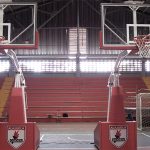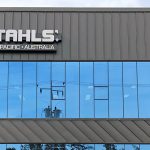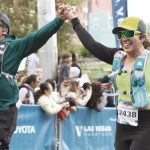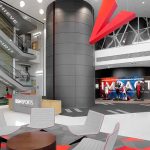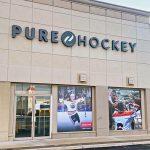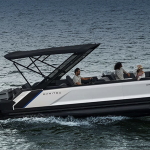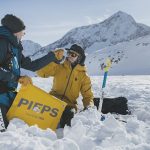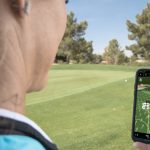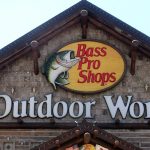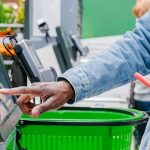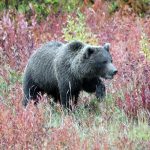Vendors reported brisk sales and no credit problems at this weekends Canoecopia event in Madison, Wisc. On March 7-9 paddling enthusiasts across the Midwest and Canada made their annual pilgrimage to the show, which kicks off a series of consumer paddling shows every spring.
Hosted by Rutabaga Paddlesports for 28 years, the consumer show is dubbed “Worlds Largest Paddlesports Exposition”. This year, major event sponsors included Kokatat, NRS, Teva, and Sierra magazine.
Cars, trucks and SUVs packed the three parking lots with custom license plates like “Wtr Trail, Kayaks and Go Tandem.” Canoecopia charges attendees $15 for a three-day pass to visit more than 200 manufacturers, outfitters and recreation advocacy organizations that fill the 100,000-square-foot Alliant Energy center convention hall.
Canoecopia continues to draw large crowds.
Cars, trucks and SUVs packed the three parking lots with custom license plates like “Wtr Trail, Kayaks and Go Tandem.” Canoecopia charges attendees $15 for a three-day pass to visit more than 200 manufacturers, outfitters and recreation advocacy organizations that fill the 100,000-square-foot Alliant Energy center convention hall.
Canoecopia continues to draw large crowds.
“Traffic has been really spectacular,” said Pat Padden, a manufacturers rep with BP Associates in St. Paul, MN. who represents Cascade Designs and Yakima agrees.
Matt Leopold, manufacturers rep for Johnson Outdoors Paddlesports said attendance was a little slow on Friday. “But Saturday was the busiest Ive ever seen,” he said. “It was shoulder to shoulder in the aisles.”
Despite a torrent of negative economic news, most exhibitors found consumers willing to spend. Danny Brown, owner of Duluth, MN.-based Whiskeyjack Paddles wasnt sure what to expect with talk of an economic slowdown. Whiskeyjack markets mid-high level wood canoe paddles priced from $99 to $160. Instead of cautious consumers, Brown found high interest and open wallets. “The paddles are selling themselves,” he said. “People are not hesitating at all.”
Padden hasnt seen any impact from recession news. “People are packing their own lunches and still buying gear,” he said.
Mike Cichanowski, owner of Wenonah Canoe and Current Designs, a longtime Canoecopia exhibitor reported sales were “going gangbusters.”
Andy Zimmerman attended Canoecopia for 14 years with Wilderness Systems. For the last two years, hes returned as the founder of Legacy Paddlesports. Located just inside the main entrance boats from the companys Native Watercraft and LiquidLogic brands drew constant attention.
Zimmerman scoffed at reports of an imminent recession. “Its [Canoecopia] has always been a buying show. They draw from six states. This is a buying crowd and an outdoors crowd. Kayak fishing is exploding and this is a big fishing area. Im not seeing a slowdown in our market.”
Native introduced cooler bags to store kayak fishermans catches, a pedal-powered boat and lightweight boats that appealed to women.
Leopold adds, “This is a very knowledgeable crowd that offers good ideas to improve the boats. The input is well received.”
A veteran of 25 years of Canoecopia events, Padden reports the demographic profile of attendees has broadened. “Im seeing a greater cross section of people now,” he said. “Were getting everything from the farmer to the medical professional who wants to buy paddling gear. If anything its spreading out even wider now.”
While boat and accessory companies dominated the show floor, apparel brands also drew buyers. Keith Anderson, director of marketing at Ibex Outdoor Clothing, attended Caneocopia for the first time and was pleased with the experience. “I didnt come in with any expectations. Foot traffic is very good and theres a lot of buzz. I like the show because it is an opportunity to meet the consumers who typically shop at Rutabaga. Im meeting with consumers who have never heard of our brand and it gives me an opportunity to make that connection. Everyone here is an enthusiast. Its fun to work with them.”
In addition to 15% discounts on all purchases, attendees come to Canoecopia to learn about destinations. Throughout the three-day event sixty speakers drew standing room only crowds in four conference rooms. Anderson pointed out the importance of the speaker component.
“Saturday morning one of the speakers talked about the virtues of wool,” Anderson said. “When the seminar got out the people hit our booths telling me Im ready to make the switch. What should I buy first? Its been very positive.”
Anderson repeated the common refrain that economic downturns arent necessarily a bad thing for outdoor retailers.
“One of the shops Ive talked to, who has been in business for 30 years, mentioned that times of recession have been good for their business,” he said. “People are no longer taking exotic vacations. They stay close to home and start backpacking and boating again. They start spending their money differently. Not to say we are recession-proof, but recession has been good business for us in the past and I can see that.”
In the convention center, there were few signs consumers were holding back. By 4pm Saturday afternoon the line of people waiting to pay for their selections reached across the convention hall floor. Twenty fast-moving check out stations kept the wait short.
A new consumer financing initiative offered this year appeared to have helped. Rutabaga partnered with GE Money to offer 90-day financing. Rutabaga partnered with GE Money to offer 90-day financing. On Saturday, participants had used the program to finance $16,000 in purchases, said Bill Duprey, relationship manager with GE Money.
“Many people told me that if it wasnt for this program, they would not have gotten a boat today,” Duprey said. He approved credit applications from people from Illinois, Missouri, Iowa and Indiana.

